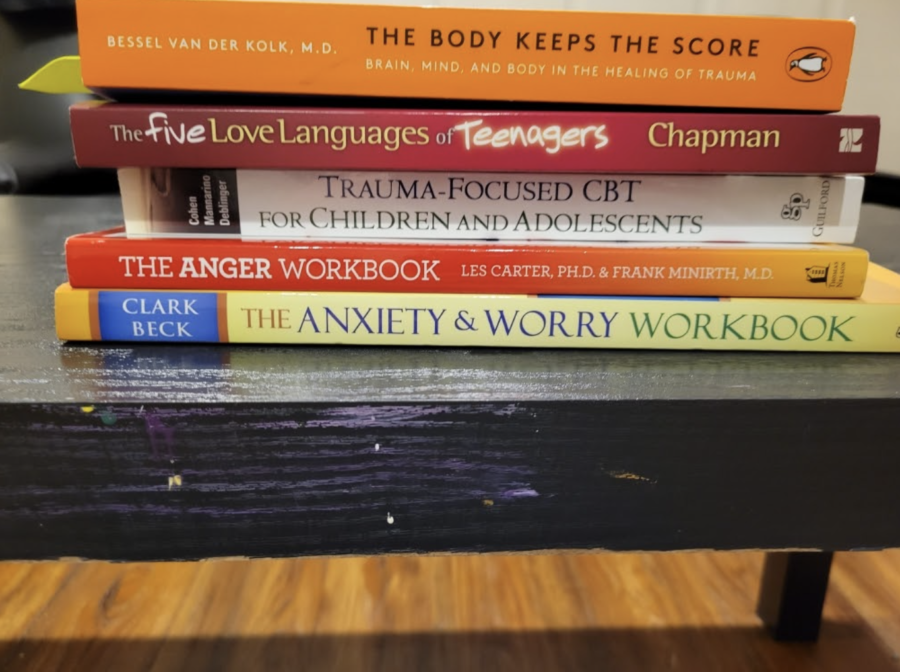Mental health in schools: warning signs and ways to help
Stack of books about mental health in teenagers.
One in six students have been diagnosed with a childhood mental disorder.
Mental illness in schools is a huge issue. Considering that almost 65 percent of students struggle with mental health it can be a community-related issue. According to the American Psychiatry Association, mental health can mean many different things to people from sadness to even schizoaffective disorder.
Mental health affects everyone, according to Guidance Counselor Ann Listerman.
“Mental health includes our emotional, psychological, and social well-being. It affects how we think, feel, and act. It also helps determine how we handle stress, relate to others, and make choices.”
Unfortunately, many don’t understand mental illness. However, counselors know how students can and may feel. In today’s society, students struggle a lot with mental illness in a wide variety, with many students going to the school counselor for help.
According to Highlands High School Guidance Counselor Trinity Walsh, it is important to ask for help from a trusted adult.
“It is important that if a student is struggling that they seek out a trusted adult who can help them determine if they need a professional involved. Diagnosed depression isn’t something that can just be solved with a few tips and tricks, and {only} a medical provider can determine how severe the problem is and what medical steps need to be taken.”
Throughout COVID-19, therapists have helped improve mental health.
Therapist Kristen Salvato talked about the importance of wanting to know their patients’ stories, habits, and medical history along with an imbalance in brain chemistry or poor nutrition can correlate to deep depression and other mental issues
“It has been found that a high amount of processed foods, sugary drinks, and high carbohydrates in a daily diet has been linked to a greater susceptibility to depressive symptoms for adolescents and adults. Low levels of Vitamin D, Folic Acid, B12, and Magnesium were contributing factors toward strengthening the imbalance of negative thoughts in the brain.“
September is suicide prevention month, which is a part of mental health awareness. Suicide is the number two killer of teenagers, and suicidal ideation, attempt, and completion are on the rise. Results from the 2019 Behavioral Risk Factor Surveillance System show that 18.8 percent of high school students have seriously contemplated attempting suicide and 8.9 percent have attempted.
Although, knowing that someone is struggling with mental illness can be hard for most. Learning the signs of someone who may be struggling with mental illness and suicidal ideation is an important factor in order to help.
Some warning signs include:
- Feeling sad or withdrawn
- Moodswings
- Intense worries or fears
- Sudden overwhelming or fear
- Trying to harm or kill yourself and/or making plans to do so
- Not eating, throwing up, and/or the usage laxatives
- Severe out of control behavior
- Changes in sleeping patterns
- Difficulty concentrating or staying still
- Consumption of drugs and/or alcohol
Therapists and counselors help give tools to somebody if they are too scared to reach out for help. Reaching out can help most tremendously and it can help start the fire to ask for help. Although not all mental illnesses can be cured they can be assisted and helped. Mental illness is a battle of ups and downs.
If you or someone you know is struggling, please use the following hotlines:
- “National Domestic Violence Hotline”-1-800-799-SAFE
- “National Suicide Prevention Hotline” 1-800-273-TALK
- “The Trevor Project”- 1-866-488-7386
Here are some helpful books regarding mental illness:
- Diagnostic and Statistical Manual Of Mental Disorders Fifth Edition. By: American Psychiatric Association.
- This Is Your Brain On Food: An Indispensable Guide To The Surprising Foods That Fight By: Uma Naidoo, M.D.
- Healing The Trauma of Domestic Violence: A Workbook For Women By: Edward S Kubany, Mari A. McCaig, and Janet R Laconsay.
- Don’t Let Your Emotions Run Your Life For Teens: Dialectical Behavior Therapy Skills For Helping You Manage Mood Swings, Control Angry Outbursts, and Get Along With Others. By: Sheri Van Dijk, MSW.
Your donation will support the student journalists of Highlands High School. Your contribution will allow us to cover our annual website hosting costs.



